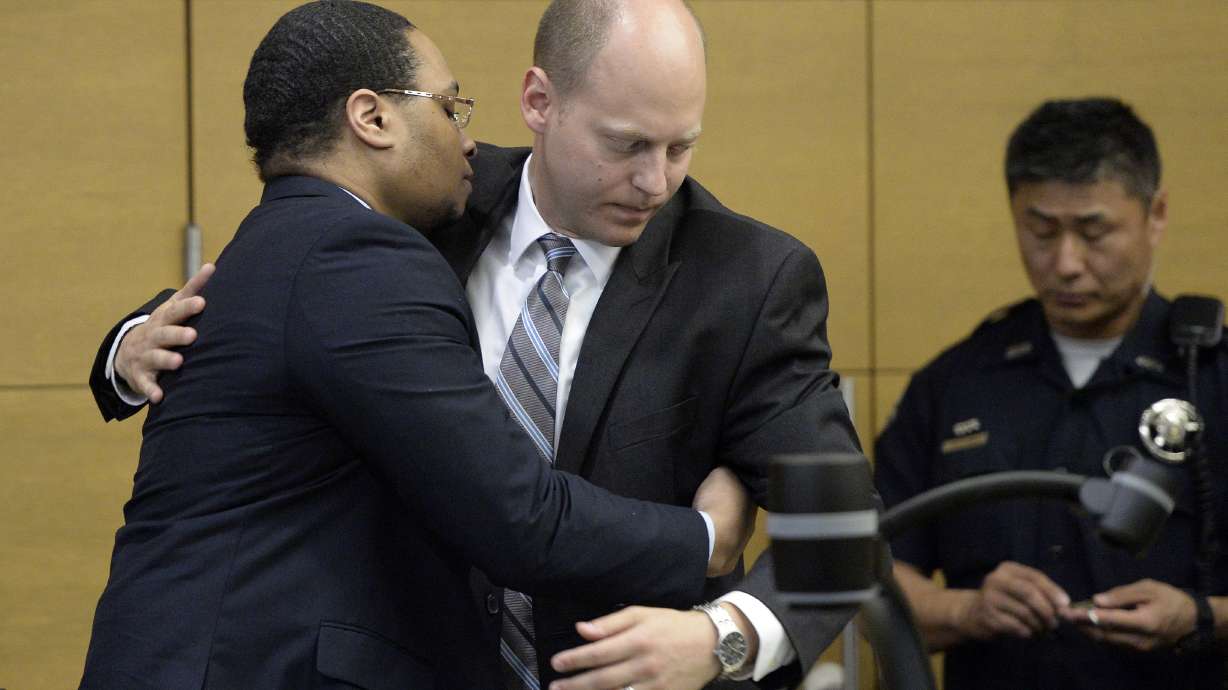Estimated read time: 4-5 minutes
This archived news story is available only for your personal, non-commercial use. Information in the story may be outdated or superseded by additional information. Reading or replaying the story in its archived form does not constitute a republication of the story.
DENVER (AP) — A Denver jury's refusal to give the death penalty to a man who stabbed five people to death in a bar, coming on the heels of theater shooter James Holmes' life sentence, has many wondering whether the ultimate penalty will ever again be applied in Colorado.
Colorado has executed just one person in nearly half a century, and only three people sit on its death row. The man closest to seeing his death sentence carried out was granted an indefinite reprieve in 2013 by Democratic Gov. John Hickenlooper, who said he had concerns about capital punishment's inconsistent application and problems in obtaining the drugs required for lethal injection, among other factors. He has urged what he calls a conversation about the death penalty in the state.
That conversation intensified Thursday after a jury decided that Dexter Lewis, 25, convicted of killing five in the bar and setting the business on fire, should be spared execution and serve a life prison sentence instead.
A separate jury earlier this month couldn't agree on the death penalty for Holmes, whose attack on a 2012 movie theater left 12 people dead and 70 injured. Holmes was sentenced Wednesday to life in prison without parole.
"These were two pretty horrific murders, and nevertheless, Colorado jurors don't have an appetite for executing people and seem to be quite satisfied with the punishment of life without parole," Denver defense attorney Dan Recht said. "This could well be the death knell for the death penalty in Colorado."
Death penalty opponents say state lawmakers should now act.
"They were the worst of the worst, and the death penalty failed," said Lindsay Schlageter, a spokeswoman for the anti-death penalty Better Priorities Initiative. "Do we really want to keep spending money on pursuing death penalty cases, when these ones didn't get it, so who will?"
Lawmakers' efforts to repeal the death penalty failed in 1999, 2009 and 2013. Hickenlooper had just granted a reprieve to Nathan Dunlap, who killed four people at Chuck E. Cheese restaurant in 1993 — but he also made clear he would veto any legislation to abolish capital punishment. He said he wasn't sure Coloradoans were ready to part ways with the death penalty, even if they use it rarely.
Hickenlooper's spokeswoman said he was traveling Friday and would not be available to comment.
The decisions in the Holmes and Lewis cases are not necessarily a sign of where the public stands, but simply show that death verdicts are difficult, "which is a good thing," Denver attorney Craig Silverman said. As a prosecutor in 1986, Silverman secured a death sentence against a man for kidnapping and killing a woman. But the man died from health problems while on death row. It was the last time a Denver jury has sentenced someone to death.
It's hard to say where Colorado voters stand on the issue. A Quinnipiac University Poll released in July found 63 percent supported execution for Holmes, while 32 percent believed he should be sentenced to life without parole. And a 2013 poll indicated 69 percent backed capital punishment.
But the polls are misleading, said Michael Radelet, a sociology professor at the University of Colorado who has long studied capital punishment. He said the death penalty in Colorado polls has generally tracked those in national ones. He pointed to a June Quinnipiac survey that showed Americans leaning against the death penalty, with 48 percent backing life sentences and 43 percent supporting death for convicted murderers.
He said Colorado prosecutors will continue to seek death. But the public conversation could start to focus on what causes mass killings rather than the penalty.
In the Lewis case, defense attorneys extensively detailed abuse he suffered during childhood as a reason why jurors should grant him the mercy of a life sentence over execution. Holmes' attorneys argued that Holmes was severely mentally ill. In both cases, at least one juror agreed.
"There's a gradual shift into trying to understand what we can do to reduce these horrendous crimes," Radelet said. "When we get these murders that just baffle us, we're fortunate to be able to have two case studies to show exactly what goes on to produce this type of violence."
Copyright © The Associated Press. All rights reserved. This material may not be published, broadcast, rewritten or redistributed.









